Why Fresh Water Is Crucial for Ferret Health
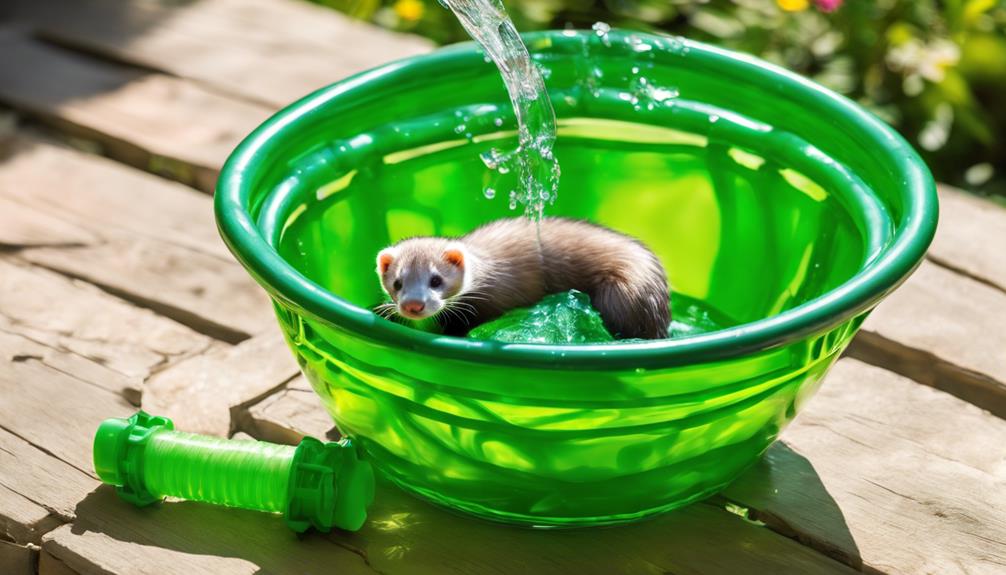
Fresh water is essential for ferret health as it helps maintain proper hydration levels and supports various bodily functions. Ferrets have a high metabolism and are prone to dehydration, making access to clean water crucial for their well-being. Dehydration can lead to serious health issues in ferrets, such as kidney problems and urinary tract infections. Providing fresh water in a clean bowl or water bottle daily is necessary to ensure that ferrets stay healthy and happy. Additionally, ferrets often play in their water bowls, so it is important to monitor and change the water regularly to prevent contamination. Adequate hydration is key to maintaining the overall health and vitality of ferrets.
Ensuring that ferrets have constant access to fresh water is a simple yet vital aspect of responsible ferret care. By prioritizing hydration, ferret owners can help prevent health problems and contribute to their pets' quality of life. Proper hydration supports digestion, circulation, and temperature regulation in ferrets, making it an essential part of their daily care routine. Regularly monitoring water intake and providing clean, fresh water are fundamental practices for promoting the well-being of pet ferrets.
Ferrets' Water Consumption Needs
Ferrets require a consistent intake of fresh water to maintain proper hydration levels and overall health. Adequate water intake is crucial for ferrets as they've a high metabolic rate and are prone to dehydration. Hydration levels in ferrets directly impact their overall well-being, affecting various bodily functions such as digestion, circulation, and temperature regulation. Ensuring that ferrets have access to clean, fresh water at all times is essential for preventing dehydration and related health issues.
Ferrets typically drink water multiple times throughout the day, especially after eating or engaging in physical activity. It's recommended to provide water in a stable, spill-proof container that's easily accessible to the ferret. Monitoring their water intake is vital, as insufficient hydration can lead to serious health complications. Ferret owners should observe their pets for any signs of dehydration, such as lethargy, sunken eyes, dry gums, or loss of skin elasticity. By promoting adequate water intake, ferret owners can help maintain their pets' hydration levels and support their overall health and well-being.
Role of Water in Digestion
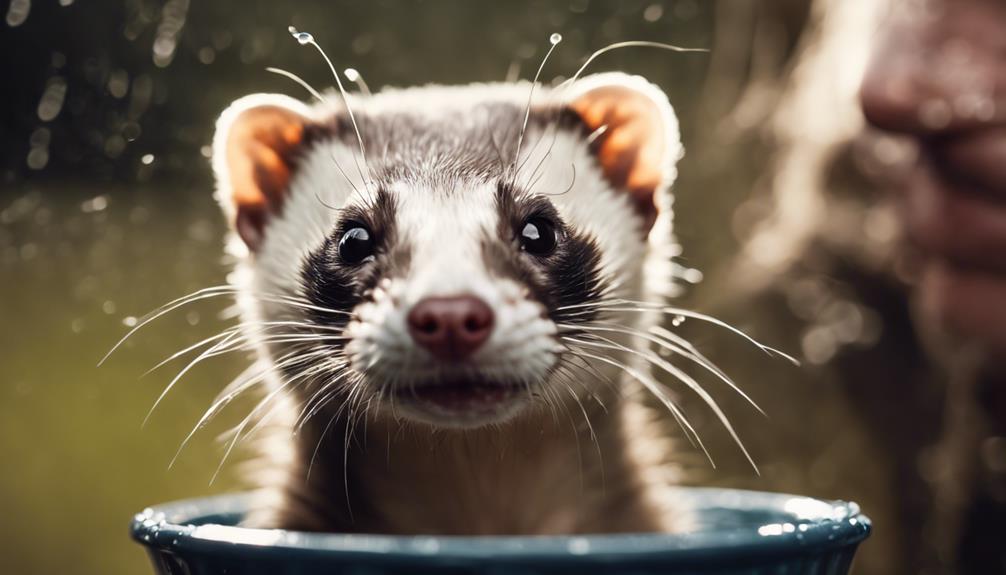
Proper hydration plays a crucial role in supporting the digestive process in ferrets. Water is essential for maintaining digestive health and enabling efficient nutrient absorption.
Here are some key ways in which water impacts ferrets' digestion:
- Water Absorption: Adequate water intake is necessary for the proper absorption of nutrients in the intestines. It helps in breaking down food particles and transporting essential vitamins and minerals throughout the body.
- Gut Flora Balance: Water contributes to maintaining a healthy balance of gut flora in ferrets. Sufficient hydration supports the growth of beneficial bacteria in the digestive system, which aids in the breakdown of food and supports overall digestive health.
- Hydration Benefits: Keeping ferrets well-hydrated helps prevent issues like constipation and dehydration, which can negatively impact their digestive processes.
- Digestive Efficiency: Hydration levels directly impact the efficiency of digestion in ferrets, allowing for smoother passage of food through the gastrointestinal tract and better overall nutrient absorption.
Importance of Hydration for Temperature Regulation
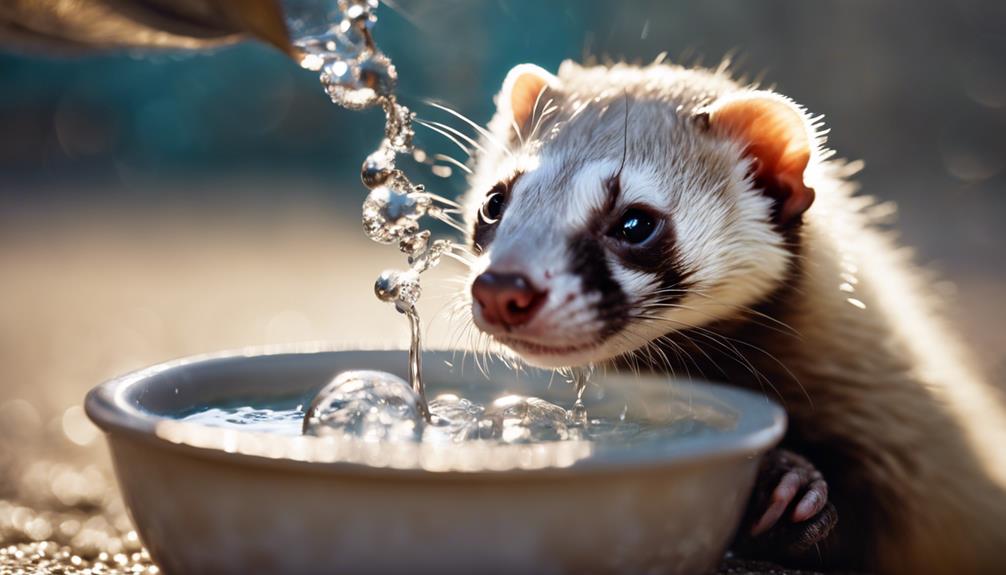
Staying adequately hydrated is essential for ferrets to effectively regulate their body temperature. Hydration plays a crucial role in maintaining the balance of body fluids and supporting thermoregulation processes in ferrets. When ferrets are dehydrated, their ability to control body temperature is compromised, leading to potential heat stress or hypothermia.
Hydration and behavior are closely linked in ferrets. Proper hydration levels ensure that ferrets can engage in their natural behaviors, including playing, exploring, and regulating their body temperature through activities like burrowing. Water is fundamental for maintaining normal bodily functions, including thermoregulation, which is essential for a ferret's overall well-being.
Moreover, water and metabolism are interconnected in ferrets. Adequate hydration supports metabolic processes, ensuring that nutrients are effectively transported throughout the body and energy is efficiently utilized for temperature regulation. Insufficient water intake can negatively impact a ferret's metabolism, leading to potential health issues and difficulties in maintaining a stable body temperature. Therefore, providing access to fresh water at all times is crucial for supporting the temperature regulation mechanisms in ferrets.
Impact of Water on Kidney Health
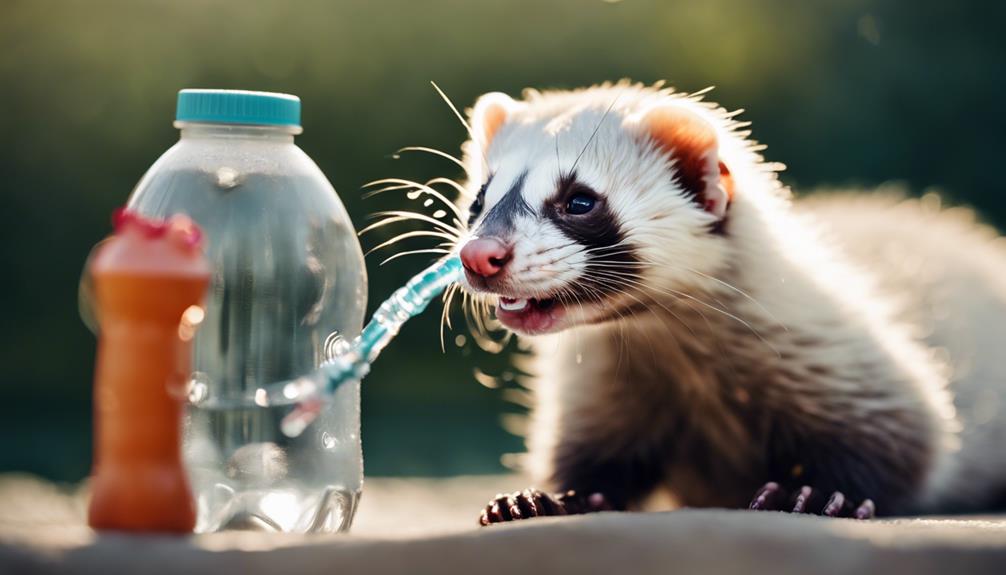
Regular water intake is crucial for maintaining kidney health in ferrets, ensuring proper function and preventing potential issues. Adequate hydration plays a significant role in supporting kidney function and overall urinary health in these animals.
Here are four key ways in which water impacts kidney health in ferrets:
- Prevention of Dehydration: Sufficient water intake helps prevent dehydration, which can strain the kidneys and lead to kidney damage over time.
- Dilution of Waste Products: Water dilutes waste products in the urine, reducing the risk of crystal formation and urinary tract issues that can affect kidney function.
- Maintenance of Blood Volume: Proper hydration levels maintain blood volume, supporting optimal blood flow to the kidneys for filtration and waste removal.
- Regulation of Electrolyte Balance: Water is essential for regulating electrolyte balance in the body, which is crucial for kidney function and overall health.
Hydration and Fur Health

Maintaining adequate hydration levels is essential for promoting healthy fur in ferrets. Proper coat hydration is crucial for ensuring the fur remains soft, shiny, and free of tangles. When ferrets aren't sufficiently hydrated, their fur can become dry, brittle, and prone to matting, leading to discomfort and potential skin issues. Grooming alone may not be sufficient to address these problems; therefore, ensuring ferrets have access to clean, fresh water at all times is paramount.
Water quality also plays a significant role in fur health. It's essential to provide ferrets with clean, uncontaminated water to prevent any negative impact on their fur. Using appropriate filtration systems can help remove impurities and chemicals that may affect the ferret's coat and overall health.
Water for Energy and Vitality
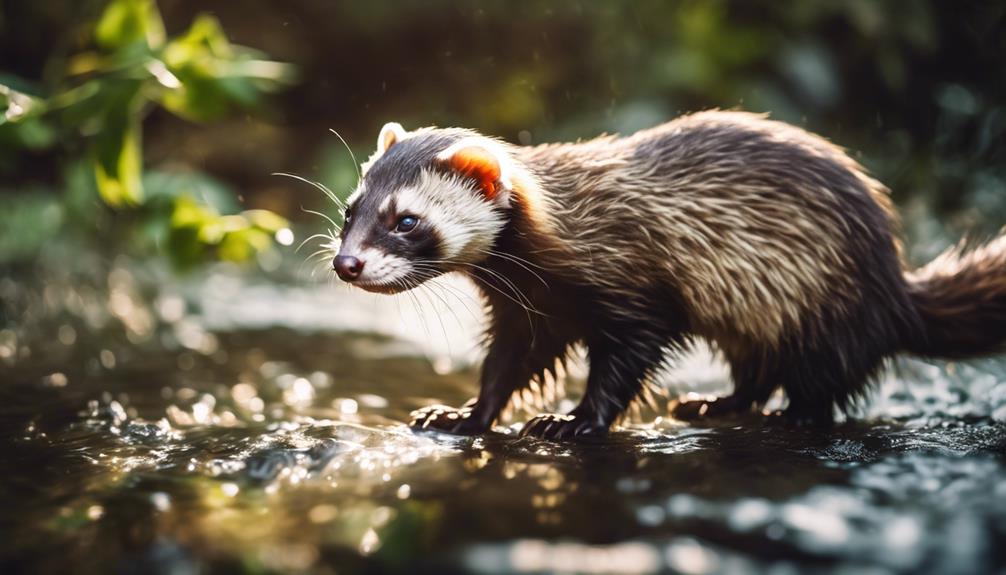
Ferrets rely heavily on proper hydration for optimal activity levels and overall health.
Water is essential for maintaining energy and vitality in these small, energetic animals.
Ensuring access to fresh water at all times is crucial to support their active nature and well-being.
Hydration for Activity
Staying properly hydrated is essential for ferrets to maintain their energy levels and overall vitality during physical activity. Adequate hydration offers several benefits for their exercise routine and performance enhancement:
- Improved Endurance: Hydrated ferrets can sustain physical activity for longer durations without fatigue setting in.
- Optimal Muscle Function: Water helps in maintaining muscle function, allowing for better performance during playtime.
- Regulation of Body Temperature: Proper hydration aids in regulating body temperature, preventing overheating during active periods.
- Enhanced Recovery: Hydration post-activity supports quicker recovery and minimizes the risk of dehydration-related issues.
Ensuring ferrets have access to fresh water at all times is crucial for their well-being and activity levels.
Essential for Health
Proper hydration is a fundamental necessity for supporting the energy levels and overall vitality of ferrets. Water quality plays a crucial role in maintaining optimal health and behavior in these animals.
Ferrets, being highly active creatures, require adequate hydration to sustain their energy levels and engage in various activities. Hydration benefits extend beyond mere sustenance; well-hydrated ferrets are more receptive to training, making it easier to teach and reinforce positive behaviors.
Monitoring water intake is essential, as dehydration can lead to lethargy and health issues. By ensuring access to clean, fresh water at all times, ferret owners can promote the well-being and vitality of their furry companions, thus fostering a happy and active lifestyle.
Preventing Dehydration in Ferrets
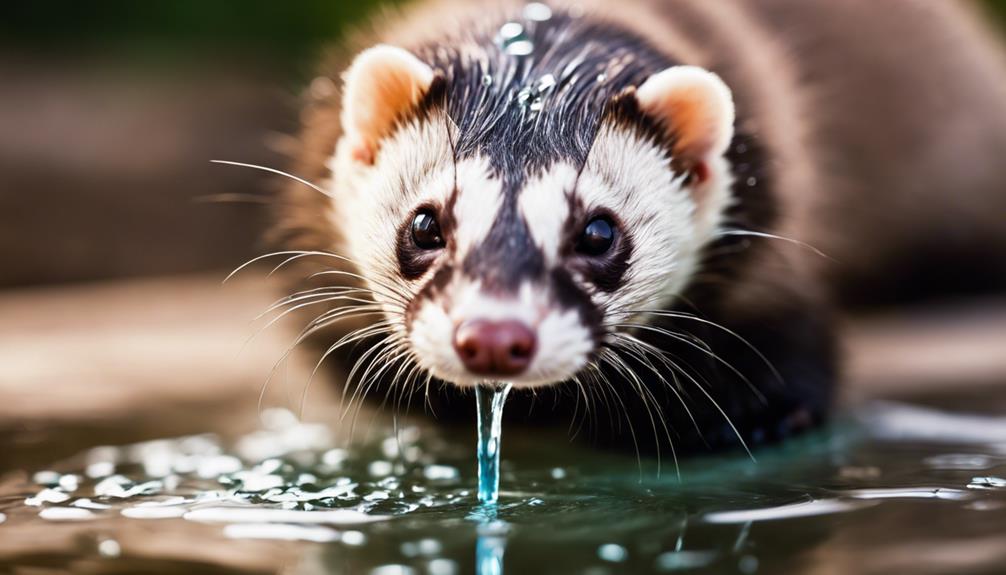
Ferret owners must be vigilant in ensuring their pets stay well-hydrated to prevent dehydration. Providing fresh water at all times, monitoring for symptoms like lethargy or dry gums, and offering water-rich foods are key strategies to maintain a ferret's hydration levels.
Understanding the signs of dehydration and offering appropriate water sources can help prevent serious health issues in ferrets.
Hydration Tips for Ferrets
To maintain optimal health in ferrets, ensuring they've adequate access to clean water throughout the day is crucial in preventing dehydration. Here are some hydration tips for ferrets:
- Water bottle alternatives: Consider using sipper tubes or gravity-fed waterers to provide a continuous supply of fresh water.
- Hydration during playtime: Encourage hydration by offering water breaks during play sessions to prevent overheating.
- Dehydration prevention techniques: Monitor water intake daily, especially during hot weather or illness, and make adjustments as needed.
- Water bowl options: Choose shallow, sturdy bowls that are tip-proof to prevent spills and allow easy access for your ferret.
Signs of Dehydration
One crucial aspect of ferret care is recognizing the signs of dehydration early on to prevent potential health complications. Ferrets can dehydrate quickly, affecting their hydration levels, behavior, and physical appearance. It's important to be vigilant for symptoms that may indicate dehydration in these small animals. Some common signs of dehydration in ferrets include lethargy, dry gums, loss of skin elasticity, sunken eyes, and decreased urination. Monitoring your ferret's water intake and observing any changes in their behavior or appearance can help prevent dehydration-related issues. If you suspect your ferret is dehydrated, it's crucial to seek veterinary care promptly to address the problem before it escalates.
| Signs of Dehydration | Description |
|---|---|
| Lethargy | Lack of energy |
| Dry Gums | Sticky or tacky gums |
| Skin Elasticity | Skin stays tented |
| Sunken Eyes | Eyes appear sunken |
Water Sources for Ferrets
Ensuring adequate access to clean, fresh water is essential for maintaining optimal hydration levels in ferrets and preventing dehydration-related issues. When considering water sources for ferrets, it's crucial to prioritize water quality and filtration.
Here are some key points to keep in mind:
- Water Quality: Ensure the water provided to ferrets is clean and free from contaminants that could harm their health.
- Filtration: Consider using water filtration systems to remove impurities and ensure the water is safe for ferrets to drink.
- Natural Sources: While natural sources like springs or streams may seem ideal, they can contain harmful bacteria or parasites that may adversely affect ferrets.
- Wells: If using well water, regularly test it for contaminants and ensure it's safe for consumption by ferrets.
Frequently Asked Questions
Can Ferrets Drink Other Liquids Besides Water to Stay Hydrated?
Ferrets should primarily drink water to stay hydrated. While they might occasionally consume other liquids, relying on alternatives can lead to health issues. Observing their water consumption habits is crucial for maintaining their well-being.
How Can I Encourage My Ferret to Drink More Water if They Don't Seem Interested?
To encourage a ferret to increase water consumption, one can try offering fresh water frequently, using a water fountain, adding wet food to their diet, or using a syringe to provide water. Consistent hydration is vital for their health.
Is Tap Water Safe for Ferrets to Drink, or Should I Use Filtered Water?
Tap water is generally safe for ferrets. It's crucial to ensure good water quality for their health benefits. Hydration is key, so offering fresh, clean water is essential. Filtered water can be a good choice for extra precautions.
Are There Any Specific Water Bowls or Dispensers That Are Best for Ferrets?
For ferrets, water bottles are better than bowls as they minimize spillage and contamination. Automatic dispensers ensure a constant water supply, but manual bowls allow monitoring intake. Choose a bottle or dispenser that's easy to clean and refill for optimal ferret hydration.
How Often Should I Change My Ferret's Water to Ensure It Stays Fresh and Clean?
To maintain fresh and clean water for a ferret, change their water bowl daily. Place the bowl away from their litter box and refill it with fresh water. Ferrets prefer drinking from bowls, ensuring proper hydration and monitoring their water consumption is essential.











